- ICRA
- Medium And Heavy Commercial Vehicles
- M&HCVs
- Vehicle Scrappage Policy
- Registered Vehicle Scrapping Facilities
Significant Potential For Scrappage With M&HCVs Older Than 15 Years, Says ICRA
- By MT Bureau
- October 08, 2024
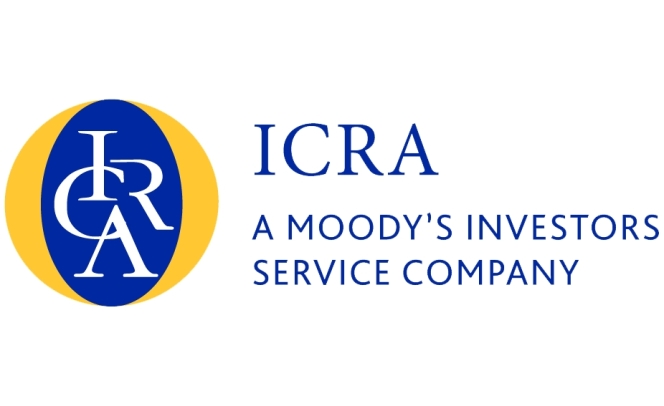
ICRA, an independent and professional investment information and credit rating agency, has said in its latest press note that the population of medium and heavy commercial vehicles (M&HCVs), older than 15 years at around 1.1 million units as on 31 March 2024, presents a substantial scrappage opportunity, but the real scrappage could be lower considering the nature of such vehicles' use. The agency is clear, though, that even if a certain proportion of these vehicles are disposed of, it can increase demand for replacements and so increase auto sales.
ICRA estimates that in the upcoming fiscal years (FY2025 and FY2026), an additional 570,000 vehicles will surpass the 15-year age criteria. Furthermore, it presents a sizable replacement demand potential for the automobile sector, since over 900,000 government vehicles are expected to be mandatory demolished under the first phase. The agency further says that scrappage potential in other segments is limited considering the low use of two-wheelers, passenger cars and light commercial vehicles (LCVs) beyond 15 years. Only 44,803 private scrap applications and 41,432 government scrap applications (including defence/impound scrap applications) had been received by the registered vehicle scrapping facilities (RVSFs) as of 31 August 2024. Announced in March 2021 in India, the Scrappage Policy, also known as the Voluntary Vehicle Fleet Modernisation Programme, is being implemented in phases, with effect from 1 April 2023. The second phase of the strategy, which began on 1 June 2024, requires scrapping based on the vehicle's fitness rather than age, making it more optional than the first phase, which sought to force the scrapping of government vehicles older than 15 years.
India now has 117 RVSFs nationwide in terms of scrappage infrastructure, and 50–70 more are anticipated to be put into service over the course of the next four to five years. Although the majority of RVSFs are now located in metro and tier-1 areas, as public awareness of the Scrappage Policy grows and the government enforces it more strictly, additional scrappage facilities are anticipated to be established across the nation. A nationwide network of scrapping facilities operated by unorganised parties will supplement the RVSFs set up by the automakers in the process of recycling and scrapping end-of-life (ELV) vehicles.
Kinjal Shah, Senior Vice President & Co-Group Head – Corporate Ratings, ICRA, said, “The Vehicle Scrappage Policy has the potential to drive multiple benefits over the long term. While it will aid in reducing air pollution as older polluting vehicles get scrapped, it will also drive fleet modernisation programmes, in turn, supporting the auto industry volumes. ICRA also expects a considerable reduction in scrap imports and raw material costs for automotive original equipment manufacturers (OEMs) through recycling of metals under the Scrappage Policy framework. Implementation of the Vehicle Scrappage Policy, however, faces several challenges, which have slowed down its pace of implementation. The limited network of RVSFs at present, inadequate incentives, lack of awareness about this policy, particularly among private vehicle owners, and issues related to registration date criteria are a few factors that have hindered the rapid implementation of the policy. While several countries in North America and the Western European region have incentivised vehicle scrappages, mainly in the form of monetary compensations, India’s implementation of the Vehicular Scrappage Policy comprises voluntary incentives (such as discounts, road tax rebates, registration fee waivers etc.) and mandatory dis-incentives (such as mandatory fitness tests, imposition of green tax, hike in renewal fees for older vehicles etc.). As on 31 August 2024, the RVSFs had received only 44,803 private scrap applications and 41,432 government scrap applications (including defence/impound scrap applications).”
Lohia Auto Launches Youdha EPOD At INR 270,000, Targets INR 10 Billion Revenue By 2030
- By Mohnish Bose
- July 17, 2025
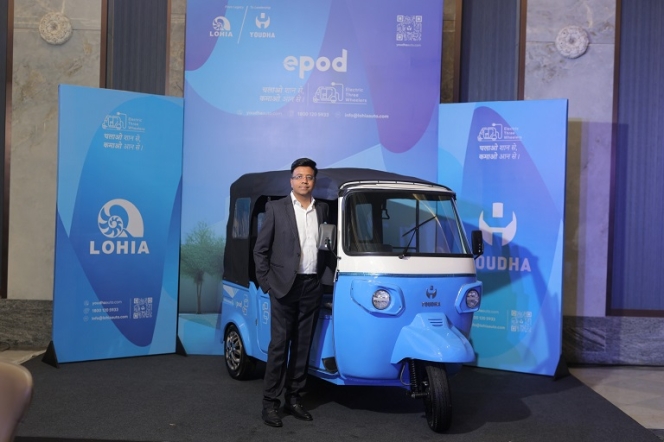
Lohia Auto has launched the Youdha EPOD at INR 270,000, marking its maiden entry into the competitive L5 electric vehicle segment.
The newly launched EPOD is equipped with a 6-kilowatt motor delivering 50 Nm of torque and is powered by an 11.8 kWh LFP battery. It offers a certified range of 227km on a single charge (upto 180-190km of real-world claimed range) and gets dual driving modes – City and Boost. Built with Indian road conditions in mind, the EPOD also features a 300mm water-wading capacity and a ground clearance of 155-160mm. It also gets an auxiliary battery at the rear which helps the primary battery ‘wakeup’ for a start.
At present, Lohia Auto’s manufacturing facility in Kashipur, Uttarakhand, has an installed annual capacity of 100,000 units. Through passenger and cargo EVs, the company targets a revenue milestone of INR 10 billion by 2030.
Ayush Lohia, CEO, Lohia Auto, said, “The Youdha EPOD reflects values of sturdiness, reliability, aspiration and affordability. It is meant to be sold to drivers, fleet owners and entrepreneurs, reflecting success and independence that is driven by the future. We are not just offering a vehicle – we’re offering economic empowerment.”
To begin with the electric autorickshaw will first be rolled out in Uttar Pradesh, Bihar and Assam, with a phased expansion planned over the coming quarters. The geographies are said to be chosen on the basis of high three-wheeler usage density, high EV adoption potential and a quickly growing base of self-employed drivers seeking efficient mobility solutions.
In line with the above, he spoke about the epod blending robust performance with aspirational identity while keeping the driver’s needs at the centre, reflected in Yodha’s tagline “Chalao Aan Se, Kamao Shaan Se (Drive with victory, earn with pride).”
Ashok Leyland And Tamil Nadu Grama Bank Join Hands For Vehicle Financing Solutions
- By MT Bureau
- July 15, 2025
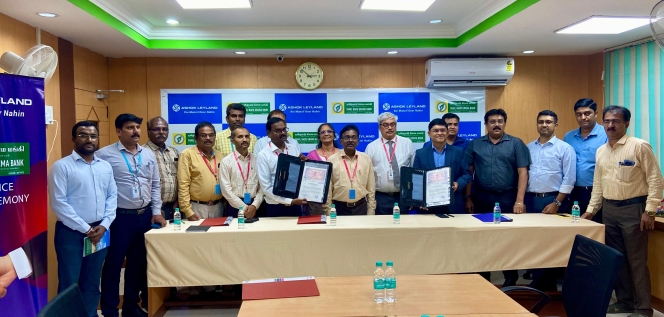
Ashok Leyland, the flagship company of the Hinduja Group and India’s leading commercial vehicle manufacturer, has entered into a strategic partnership with Tamil Nadu Grama Bank to offer tailored vehicle financing solutions. This collaboration aims to enhance accessibility for commercial vehicle customers across Tamil Nadu by providing customised loan options with flexible repayment plans.
The memorandum of understanding (MoU) was formally signed by Viplav Shah, Head of LCV Business at Ashok Leyland, and Kannan Ponnuraman, General Manager of Tamil Nadu Grama Bank, in the presence of Mani Subramanian, the bank’s Chairman. Through this alliance, Tamil Nadu Grama Bank will extend end-to-end financial support to Ashok Leyland’s customers, ensuring convenient and customer-centric loan facilities.
With 676 branches spread across Tamil Nadu, Tamil Nadu Grama Bank offers a diverse portfolio of financial products catering to various segments, including agriculture, retail, and Micro, Small and Medium Enterprises (MSMEs). The bank is also committed to advancing financial inclusion by promoting government schemes and delivering affordable banking services to underserved communities.
Ashok Leyland boasts an extensive lineup of commercial vehicles, ranging from light commercial vehicles for intercity transport to heavy-duty trucks and a wide array of buses. Known for their safety features and driver-friendly designs, Ashok Leyland’s vehicles also emphasise sustainability, with alternative fuel-powered buses contributing to eco-friendly transportation solutions. As an industry leader in innovation, Ashok Leyland continues to drive progress in India’s commercial vehicle sector while prioritising environmental responsibility.
Shah said, “We are delighted to partner with Tamil Nadu Grama Bank to offer our customers convenient and attractive vehicle financing solutions. This strategic collaboration will further strengthen Ashok Leyland’s presence in the market and enhance accessibility to our innovative, cost-efficient products. At Ashok Leyland, we are committed to delivering industry-leading value and exceptional experiences for our customers, empowering them to achieve greater profitability and success.”
Subramanian said, “Tamil Nadu Grama Bank is pleased to partner with Ashok Leyland to offer seamless vehicle financing solutions. This association reflects our dedication to serving the diverse financial needs of commercial vehicle customers. We are confident that this collaboration will enable us to extend our reach and provide tailored financing options to support the growth of businesses in the commercial vehicle segment.”
- Tata Motors
- Bengaluru Metropolitan Transport Corporation
- BMTC
- Tata Starbus
- TML Smart City Mobility Solutions
- Ramachandran R
- Anand S
Tata Motors Starts Delivery of 148 Advanced Starbus EVs to Bengaluru Metropolitan Transport Corporation
- By MT Bureau
- July 14, 2025
Tata Motors, one of India’s largest commercial vehicle manufacturers, has started deliveries of an additional 148 advanced Tata Starbus electric buses to the Bengaluru Metropolitan Transport Corporation (BMTC).
The Tata Starbus EV is designed for intra-city operations and is equipped with new-gen electric powertrain, Electronic Stability Control, Electronic Brake Distribution and an Integrated Transport System. With a low-floor design, it offers ergonomic seating for 35 passengers.
These e-buses will further complement the 921 e-buses already plying on the Bengaluru roads. The fleet will be operated and maintained by TML Smart City Mobility Solutions, a wholly owned subsidiary of Tata Motors, under a 12-year contract.
Ramachandran R, IAS, Managing Director, BMTC, said, “Tata Motors electric buses already running across Bengaluru have shown outstanding performance, clocking high uptime and meeting public expectations on comfort and convenience. Based on this success, we are pleased to induct an additional 148 e-buses from Tata Motors. These buses will further enhance our ability to offer citizens a safe, sustainable and efficient travel option on a wider network across Bengaluru.”
Anand S, Vice-President and Head – TML Smart City Mobility & Commercial Passenger Vehicle Business, Tata Motors, said, “It is a momentous occasion as we commence deliveries for yet another fleet of our environment-friendly and efficient Starbus electric buses to BMTC as per schedule. We are honoured by the trust shown by BMTC not only for our products but also on our ability to deliver an unparalleled uptime for two years, clocking over six crore cumulative kilometres. We remain committed to supporting their vision for sustainable, public transport by delivering innovative e-mobility solutions backed by technology, service and execution.”
- MG Group
- BhartBenz
- Tigra
- bus body
- Anil Mohan Kamat
- Sivakumar V
- Tata Motors
- Ashok Leyland
- Eicher Motors
MG Group Unveils New Corporate Identity, Launches Premium Bus Coach Tigra
- By MT Bureau
- July 09, 2025
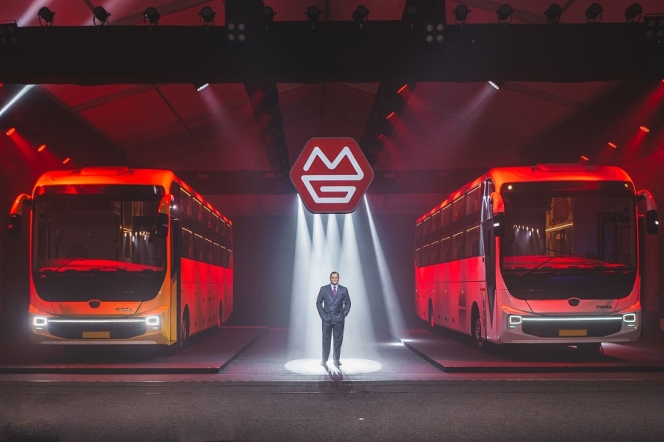
MG Group, a leading private coachbuilder in the country, revealed its new brand identity on 5 July 2025 at the company’s flagship event christened ‘Re-born’ in Bengaluru. The new brand identity announced a significant transformation for MG, from a contract manufacturer supporting high-volume OEM production to a product-led, brand-driven, mobility solutions provider.
In addition to a new brand logo, the company also introduced its new premium intercity coach ‘Tigra’, built on a BharatBenz chassis. Interestingly, the company revealed that the new coach is modular in nature and is available on all 13.5-metre coach chassis for domestic and international markets. The coaches will be produced at MG’s Coach Manufacturing Facility in Belagavi, Karnataka where it claims to have made substantial investments have been made in tooling, jigs and quality systems.
Anil Mohan Kamat, Chairman & Managing Director, MG Group, said, “This particular product is on the BharatBenz chassis, but we’ve made it compatible with other OEMs like Ashok Leyland, Tata Motors and Eicher Motors too.”
The event also saw over 400 orders for the Tigra coaches being placed by MG Group customers.
The Tigra features mood-based lighting, ABS-moulded interiors for safety and PU leather on the seats to provide a premium feel for users. It also gets USB and laptop charging points on every berth, with digital displays designed to guide riders to their seats. DRLs and LED projector-type headlamps with integrated progressive indicators, fog lamps and LED tail lamps with indicators are visible on the outside.
For the unversed, MG Group entered the premium coach segment almost a decade ago. Since its inception in 1996, the company is said to have delivered more than 125,000 bus bodies across various applications, such as intercity, staff, school, mofussil and special purpose segments (ambulance and defence applications).
Sivakumar V, President – Strategy & Sales, MG Group, said, “In the bus and coach body-building industry, progress is never overnight. It’s built on strong relationships, consistent quality, and the ability to evolve with changing transportation needs.”


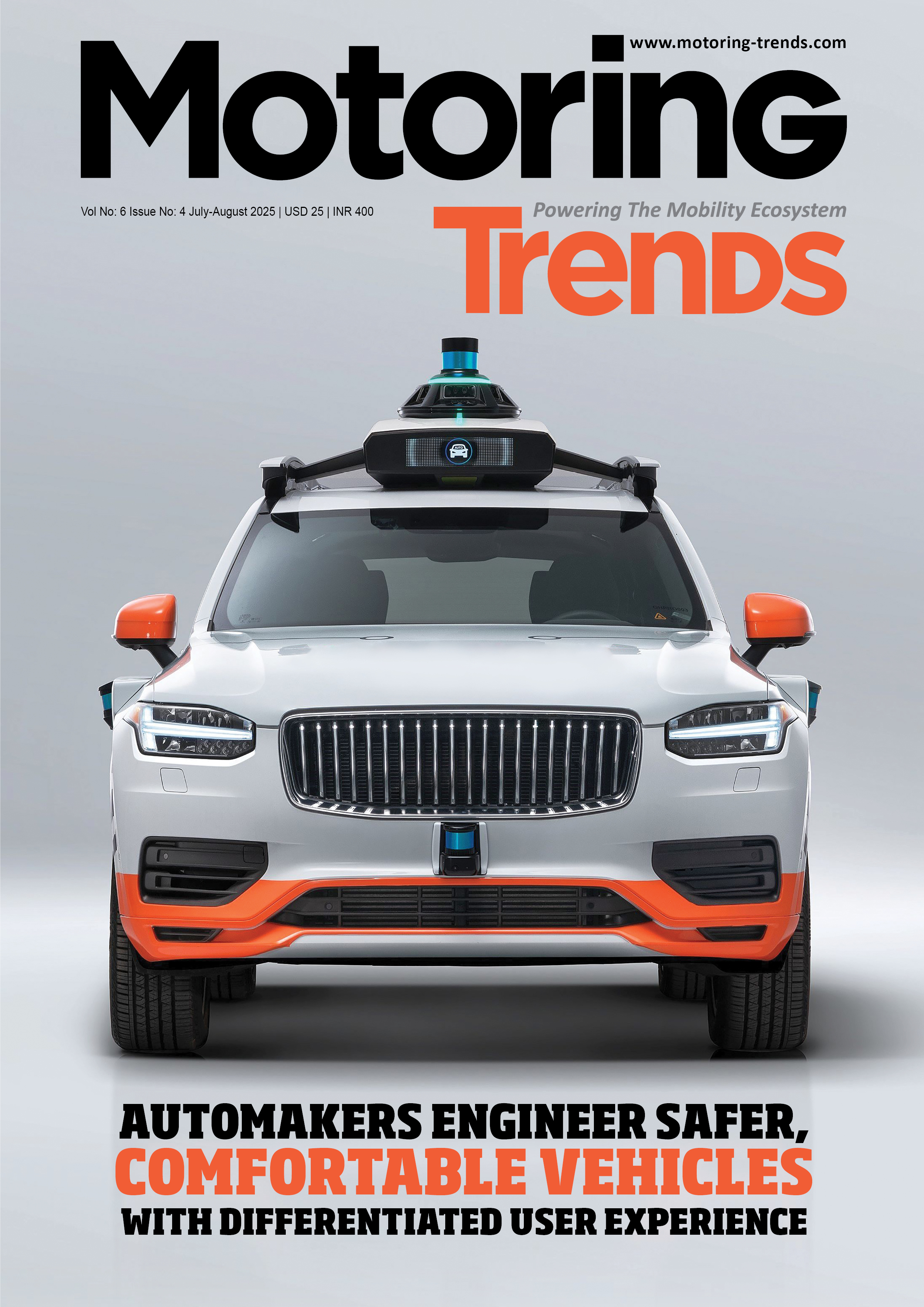
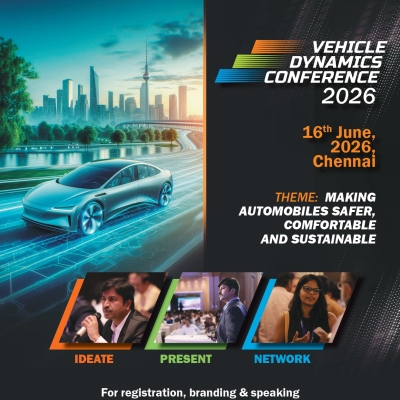
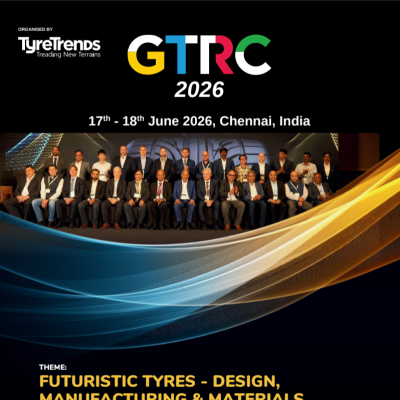
Comments (0)
ADD COMMENT